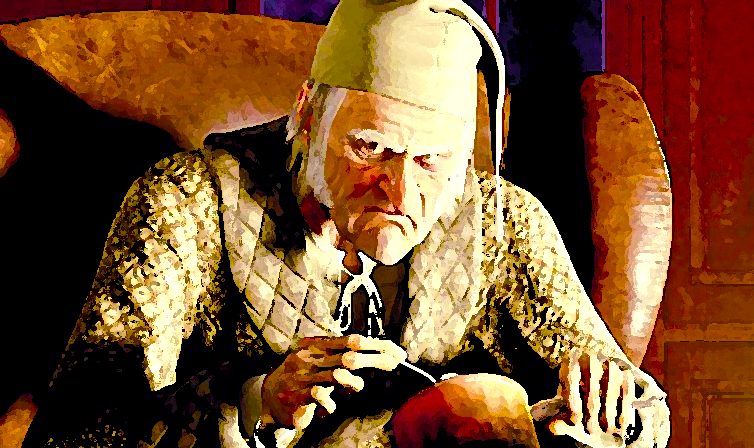Tuesday
During the Reagan presidency (in 1983) I remember being shocked when Attorney General Ed Meese came to the defense of Scrooge, arguing that he “had a bad press in his time. If you really look at the facts, he didn’t exploit Bob Cratchit.” Now conservatives make such arguments so frequently that former Senator Phil Gramm and lobbyist Mike Solon, writing “In Defense of Scrooge, Whose Thrift Blessed by World” for the Wall Street Journal, elicits no more than a resigned shrug.
Meese was part of an administration that was (among other things) targeting free lunch programs and arguing for such cost-cutting measures as redefining ketchup as a vegetable. His argument was that
Cratchit earned 10 shillings a week, a good wage at the time, his family could enjoy a good Christmas meal, and he was fortunate to be able to read and write because there was no public education at the time in which the story was set, the 1840s.
No word about Tiny Tim’s eventual death due to the lack of affordable health care:
“Spirit,” said Scrooge, with an interest he had never felt before, “tell me if Tiny Tim will live.”
“I see a vacant seat,” replied the Ghost, “in the poor chimney-corner, and a crutch without an owner, carefully preserved. If these shadows remain unaltered by the Future, the child will die.”
“No, no,” said Scrooge. “Oh, no, kind Spirit! say he will be spared.”
“If these shadows remain unaltered by the Future, none other of my race,” returned the Ghost, “will find him here. What then? If he be like to die, he had better do it, and decrease the surplus population.”
Amazingly, we’ve been hearing a version of this “surplus population” argument from some on the right regarding the Covid crisis. Laissez faire herd immunity (No more than two million killed, tops!) would involve culling the elderly and unhealthy, many of whom are conveniently people of color. But back to the Gramm and Solon article.
I rely on an account of the piece by Graham Dockery of Irish public television since I don’t have a WSJ subscription:
[T]he pair argued that Scrooge would have served society better had he hung onto his wealth and used it to fund Britain’s industrial output, which, when Dickens penned A Christmas Carol in 1843, had already made Britain the world’s only superpower.
“Scrooge’s wealth accumulation would have benefited far more people than anything he gave to charity after his reclamation, and many times more than the government would have helped had they taken his wealth and spent it,” the pair wrote.
Gramm and Solon describe Ebenezer as a prototypical magnate, the kind who oversaw Britain’s transition from a rural society to an urban one. Between 1840 and 1900, they pointed out, wages nearly tripled, life expectancy rose by 20 percent while the mortality rate plummeted, and children – who, a century earlier, had risked life and limb in Britain’s first factories – were enrolling in school in ever-growing numbers.
I have voiced my own disagreements with Dickens’s approach to social reform, which relies on rich people turning benevolent rather than oppressed workers uniting to demand better conditions. Dickens focuses on the Cratchit family and a few charities while, in Hard Times, he excoriates trade unions for exerting pressure on factory owners. The mob violence depicted in Barnaby Rudge and Tale of Two Cities shows us Dickens’s view of the oppressed taking charge of their own fate.
While I disagree with Dickens’s politics, however, I don’t question his heart. I do question Gramm, Solon and many of America’s upper class being willing to support a sociopath for president on the grounds that he keeps their taxes low. Pre-reform Scrooge would fit right in and, although he is stingy with his money, I can imagine him–out of self interest–contributing to Trump’s reelection campaign.
Dockery, incidentally, points out that it was not laissez faire capitalism that improved the living standards of 19th century Bob Cratchits:
[Th]e Scrooges of the day didn’t always make the lives of their workers better by choice. Trade unions were legalized only in 1871. The government, not factory owners, mandated health & safety and sanitation rules in factories in 1866, and it would be another eight years after that until the employment of children under 10 in textile factories was outlawed.
Dockery also does the math, noting that our modern-day Scrooges dwarf the original one:
Scrooge’s profession isn’t mentioned in the story, but we do know that Cratchit was a clerk. Working in one of the better-paying banks at the time, he could have hoped to bring home an annual salary of £60. Meanwhile, bank owner James ‘Jemmy’ Wood – a Scrooge-like character known as ‘The Gloucester Miser’ – died in 1836 leaving a fortune of £900,000, at the time making him Britain’s wealthiest commoner.
The average worker at Amazon last year made $28,836, while CEO Jeff Bezos sits on a fortune of $199.7 billion. That’s nearly seven million times the average yearly wage at Amazon. By contrast, Wood’s net worth in 1836 was just 15,000 times more than a London bank clerk’s salary.
We are currently undergoing a Christmas where millions are unemployed and in danger of losing their homes, where long lines form to pick up groceries, and where many are sick and dying of Covid. Republicans, who ran up the debt to a trillion dollars with their generous tax cuts for the rich, are now squawking that a $600 relief check for average Americans will bust the budget. No wonder Wall Street Journal columnists are defending Scrooge.


